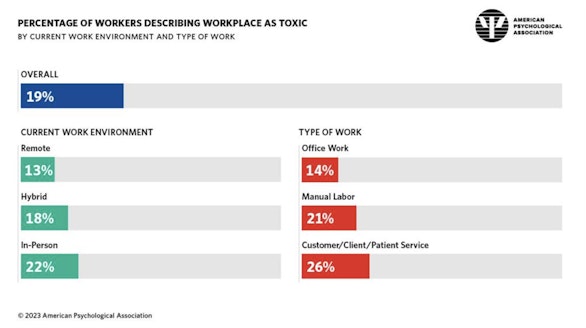2023 Work in America Survey reveals need for mental health support
How are US employees feeling about their work and workplace? The results of a major new survey from the American Psychological Association suggests that psychological safety is becoming paramount
Mental health and wellbeing has become a key priority for US workers according to the American Psychological Association’s 2023 Work in America Survey, which reveals that nine out of ten US employees want their employer to value their emotional and psychological welfare – and provide relevant support.
More specifically, 57 per cent of those surveyed (2,515 employed adults in April 2023) thought this was very important and 35 per cent viewed it as somewhat important. Even higher numbers (95 per cent of all respondents) shared that it was either somewhat or very important to feel respected at work and to work for an organisation that respects the boundaries between work and non-work time.
Influencing wellbeing
Workplace design and technology can influence mental health and wellbeing in many ways, sending positive non-verbal messages about what the organisation thinks of its employees and supporting communication among colleagues, which is vital for organisational success. When employees feel valued, they’ll put in more professional effort, often enough to pull their group successfully though tough times.
Besides getting non-verbal messages right, the most important thing that a workplace needs to do is align with the task at hand. We excel at our jobs when we have a comfortable level of control over our physical environment (for example, when we can change the lighting or have options about where we work). Eight out of ten of study participants in 2023 Work in America survey were satisfied with their level of control over how, when, and where they work.
Research reported in this column in the past is consistent with the survey’s findings that that level of control is linked to overall better mental health (‘those who reported satisfaction with their level of control were much more likely to report that their overall mental health level is good or excellent’).
Hybrid and remote workers were more likely to be satisfied with how, when, and where they work (85 per cent for hybrid and 89 per cent for remote) than were in-person workers (77 per cent).
People have a fundamental need to grow and develop in ways that are meaningful to them, which can vary a lot from one person to another. Among study participants, 91 per cent reported that it was important to them that they consistently have opportunity to learn on the job.
Work-related stress
Happily, 72 per cent of participants agreed that their employer helps employees develop and then maintain a healthy lifestyle. But are companies under-estimating the task of supporting mental health? More than half of those workers surveyed (55 per cent) felt that their employer thinks the workplace is a lot mentally healthier than it is.
Overall, 77 per cent of US workers reported feeling work-related stress in the previous month and 57 per cent reported stress-linked factors that have been tied to workplace burnout (for example, 20 per cent reported lower productivity, 19 per cent irritability or anger with co-workers and customers, 18 per cent feelings of being ineffective and 26 per cent didn’t feel motivated to do their very best while 31 per cent stated they experienced emotional exhaustion).
Around one on five American workers described their workplace as ‘toxic’, with employees in client, customer or patient service more likely than office workers to offer this characterisation.

The American Psychological Association notes US Surgeon General’s essentials for workplace mental health and belonging. These include ‘protection from harm (including security and safety), connection and community (including social support and belonging) . . . and mattering at work (including dignity and meaning)’. According to the survey, people do seem to feel safe at work with 87 per cent reporting that they were satisfied with the physical health and safety practices at their place of work. And most workers (81 per cent) indicated that their workplace provides opportunities for collaboration and teamwork.
Overall, the survey results present an interesting insight into the psychology of the current world of work – with useful implications for developing and deploying workplace design and technology. Read about the American Psychological Association’s 2023 Work in America Survey in more depth here.
Read more of the latest research insights from Sally Augustin in Research Round-up, her regular column in the Innovation Zone here.








